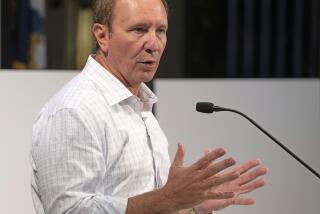First Elected Black Governor, Wilder Is Rising Political Star
- Share via
RICHMOND, Va. — As a young black man waiting tables for white movers and shakers in segregated Richmond, L. Douglas Wilder recalls getting his first exposure to politics.
“I would hear things that were going on,” he said the other day, “and I was almost Ralph Ellison’s ‘Invisible Man.’ People would say things as if we weren’t even there.”
He is invisible no more.
He has been a Virginia state senator and lieutenant governor. Last year he became the state’s, and the nation’s, first black elected governor. And now Lawrence Douglas Wilder, 59, is increasingly mentioned as presidential or vice presidential material.
He is not discouraging speculation about his aspirations. He has made repeated forays into states that hold early presidential contests. His aides recently formed a political action committee to spread his message of “fiscal responsibility” around the nation.
Wilder knows the dangers of national ambitions. In an interview in his Richmond office, he ticked off the names of black politicians who once enjoyed great prominence, then plummeted to disdain or obscurity: Adam Clayton Powell . . . Edward Brooke . . . W. Wilson Goode. In other cases, he noted, black people have held offices such as Chicago mayor and lieutenant governor of California and Colorado, only to be replaced by whites.
“I don’t want us to be a blip on the seismograph,” Wilder said.
His recent statements reflect that ambition.
Wilder recently told a Virginia symposium on the savings and loan crisis that “in the 1990s, it will be up to America’s leaders to bridge the rapidly growing gap between ‘Washington in Wonderland’ and the very real landscape upon which the rest of America must struggle daily to earn a living and to raise their families. If they cannot . . . then they should not be surprised when the American people ask . . . them to step aside for new architects.”
During the interview, Wilder accused President Bush of “intellectual dishonesty” for dispatching troops to the Persian Gulf to reinstate rulers in “a despotic nation” but not protecting the civil rights of people back home.
By vetoing the Civil Rights Act of 1990, he said, Bush “has abdicated moral leadership.”
“I know what quotas are; I have experienced them firsthand,” Wilder said in a recent letter to Bush.
Is Wilder simply outraged, or is he running for something?
He said he is not running for President in 1992. Asked if he would rule out accepting the No. 2 spot on the ticket, Wilder smiled broadly and said: “I wouldn’t rule it out, but I’m not running for it, and I don’t anticipate it.”
Hardly anyone who watches politics believes him.
“He’s running for President,” political analyst William Schneider said. “He doesn’t hide it.”
“I think he is certainly running for something,” said Merle Black, Emory University political scientist. “He is clearly advertising his availability, either as a presidential candidate or as a vice presidential candidate.”
Wilder makes such good fodder for speculation for several reasons. His tough fiscal stance--proposing to cut at least $1.4 billion from the state’s $26-billion biennial budget and promising no new taxes--produces the kind of hardheaded image Democrats think they need to win the White House.
His credentials as a fiscal conservative are so strong that Richard Viguerie, the king of direct-mail fund raising for the Republican right wing, said conservatives might well consider supporting him.
At the same time, with Harvey Gantt defeated in the North Carolina Senate race and Andrew Young losing in the Georgia governor’s race, Wilder has moved to center stage among black politicians.
“He’s a rising star in the Democratic Party,” said James Ruvolo, chairman of the Ohio Democratic Party. “He is socially liberal and fiscally conservative,” Schneider said. “In my mind, that is a perfect formula for the suburbs. And that’s where the votes are.”
But before he runs for anything else, Wilder must survive Virginia. Many Virginians fear that Wilder’s proposed budget cuts will result in inadequate social services and that programs ranging from road-building to education will suffer.
“People in Virginia have marveled at how much national praise he has been given while his approval ratings in the state are rather modest,” said Robert Holsworth, political scientist at Virginia Commonwealth University.
He could also face some criticism from liberal elements of the party nationwide.
Robert Smith, political scientist at San Francisco State University, said it would be “a hollow victory” if black politicians had to sacrifice their “substantive policy agendas” for representation in high places. “The new black politician would then be a a shell of himself, more like a Prince or Michael Jackson than a B. B. King or a Bobby Bland,” Smith wrote in a paper last February.
But Wilder rejects any contention that his budget proposals are Draconian, and he seems to relish the combat surrounding them. During the interview, he happily recounted a meeting in which a university student complained that a college bowling alley might fall victim to the budget ax. The governor remembers saying that he was unaware that a bowling alley was essential to education.
Two names surface whenever Wilder’s national potential are discussed: Jesse Jackson and Patricia Kluge.
Jackson is an ally and potential rival. Kluge is a friend and potential liability.
Jackson, who said he talked with Wilder before running for President in 1984, said that historic run and his 1988 campaign served to “change the climate and create new expectations,” allowing blacks, including himself, Wilder, Rep. William H. Gray III (D-Pa.) and Joint Chiefs of Staff Chairman Colin L. Powell, to become “a legitimate part of the political equation.”
Jackson did not rule out a third presidential campaign himself, reminding a visitor that he is a proven vote-getter and magnet for voter registration.
Being compared to each other seems to please neither man.
Kluge is the attractive divorcee of America’s richest man, John Kluge. Rumors about what Kluge and Wilder mean to each other have lifted eyebrows because many people believe that Wilder’s political career would suffer dramatically--if it survived at all--if he was romantically involved with a white woman.
In a typical comment, Beverly Druitt, a black attorney who lives in Fairfax County, Va., said white voters “are not going to select someone as vice president or President who is hooked up with a white woman. And a rich one too.”
“I have said on so many occasions that we’re just friends,” the governor said tersely, adding that “if my being friends with anybody hurts me, then it hurts me.”
Wilder has been divorced for 12 years. He is a lifelong Virginia resident and earned a chemistry degree at Virginia Union University in 1951. He was awarded the Bronze Star after helping wounded Army comrades while under enemy fire in Korea.
Prohibited by segregation laws from attending law schools in Virginia, Wilder went to Howard University School of Law in the nation’s capital, graduating in 1959. He married the former Eunice Montgomery a year earlier. They had a son and two daughters before the 1978 divorce.
His let-the-chips-fall-where-they-may attitude has fueled an independent course.
The NAACP has criticized Wilder because of his support for the death penalty and because he opposes a congressional redistricting plan that would create a majority black district. He remains unfazed, complaining in the interview that the NAACP made the tactical mistake of failing to consult him on redistricting strategy before consulting with state Republicans.
Despite his zest for political combat, Wilder knows when to fold. After a long silence while the U.S. Justice Department sued to force the Virginia Military Institute to admit women and critics urged him to speak out, Wilder only recently announced that he was prepared to testify in court against the taxpayer-funded school.
Max Cleland, who is Georgia secretary of state and was administrator of the Veterans Administration under former President Jimmy Carter, compares Wilder to Carter, who ran for President in 1976 after serving the one-term limit in Georgia. The law has since been changed in Georgia, but Wilder faces a similar one-term limit in Virginia.
Both men were forced “to immediately start looking at greener pastures beyond their borders,” Cleland said. “One can hardly blame them since they are a lame duck the day they are sworn in. Wilder has nowhere to go but play that national hand. It’s a roll of the dice, but what has he got to lose? Zero.”
“You’re only going to be here a second,” Wilder said in the interview. “When you have the opportunity to influence change, I think you ought to take every possible opportunity to do it.”
To ensure continuity of black political progress, Wilder said, he wants to help black Americans create political “shark teeth,” explaining: “When a shark loses his tooth, he doesn’t have a gap. It’s just that the back row moves up. That political cadre hasn’t been developed in the African-American community.”
The development will come through a long-term “mentoring process,” Wilder said, in which youngsters are taught politics and other skills, including journalism and police work, by those who practice them.
In a similar vein, Wilder sent Bush a letter last week urging him to reverse the U.S. Education Department’s finding that it is generally illegal to offer scholarships designated for minority students. Wilder warned that the policy, which was modified this week, would have a chilling effect on all programs targeted for minorities.
On a non-racial front, Wilder said he will preach the moderate policies of what he calls “America’s new mainstream--that current which recognizes that social conscience and fiscal responsibility can go hand in hand.”
“When things are going well, I don’t let it go to my head,” Wilder said, standing behind his desk at the end of the interview. “When things are written otherwise or said otherwise, I don’t let that affect me, either. I try to have an even flow. I pretty much know who I am.”
Staff researcher Edith Stanley contributed to this story.
More to Read
Get the L.A. Times Politics newsletter
Deeply reported insights into legislation, politics and policy from Sacramento, Washington and beyond. In your inbox twice per week.
You may occasionally receive promotional content from the Los Angeles Times.










